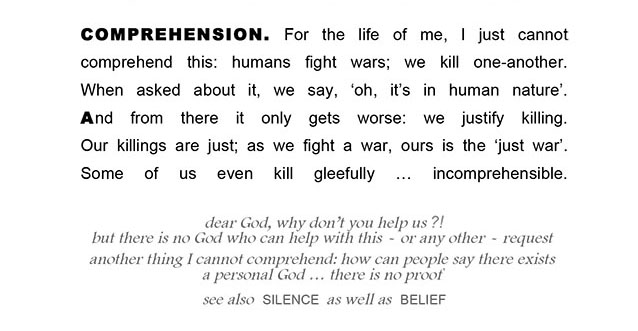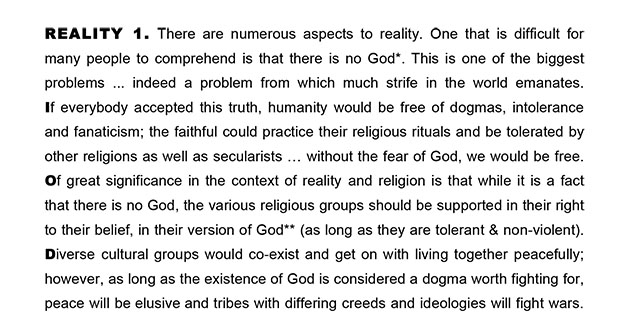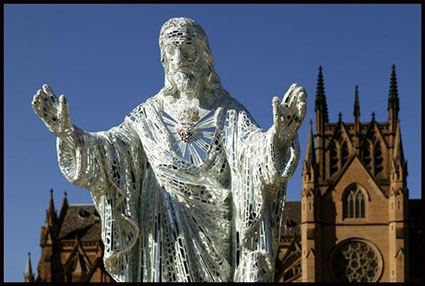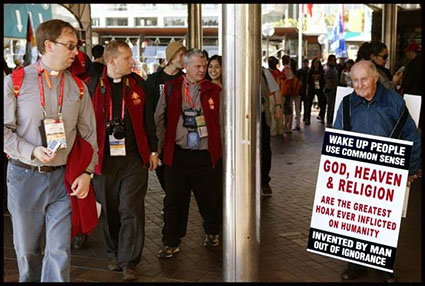Christianity, God, Belief, Reality and Delusion
Is the Christian belief in God delusional? (I often write about spirituality.)
I had an email exchange, where I re-visited my desire to comprehend just why or how anyone can believe in a personal God, the type one can communicate with, who will respond to prayers etc. However, I failed and I had to amend my COMPREHENSION essay accordingly (in the footnote):

My contention is that such a belief is delusional …
My book en.light.en.ment endorses the notion of acceptance of all beliefs ... as long as they are tolerant and non-violent. My argument is the reality of mono-theistic religions - i.e. Judaism, Christianity, Islam - is that they are neither tolerant (with their dogmatic belief in the one God) nor non-violent (borne out by their violent histories). My book opens with a note:

In one of my essays on REALITY I make the point that religions should be able to live with a non-dogmatic belief, that would exclude the belief in a (potentially evil, war mongering) God:

... so, the person I was communicating with insisted, he was not delusional and that I had no chance of convincing him that there was no God:
“Look, I get your fascination for seeking truth, but you will always be limited if you rely only on your own knowledge - or even that of all humanity. Faith allows us to go beyond what we can fathom with our intellect alone. If we could work God out by mere logic there would be no need for a God. There is nothing wrong with seeking knowledge of our wonderful world but really all the wisdom of humanity is like a grain of sand in the Sahara Desert.”
“My life and beliefs are not based on my limited human understanding - they are based on a connection to the supernatural Creator of heaven and earth. You will never be able to convince me there is no God. I have had too many miraculous encounters to ever again live in the limited world of doubt or denial. I am not delusional - in fact I see life more clearly than I ever have. I am no longer just run by the limitations of the human mind as my spiritual eyes are open and they are far more trustworthy than my natural eyes.”

I took the photos in this blog at the World Youth Day in 2008
My friend makes the point that there is a miraculous dimension to the world and we used a quote from Albert Einstein to debate this contention. I quoted Einstein thus:
“The fairest thing we can experience is the mysterious. It is the fundamental emotion which stands at the cradle of true art and true science.”
His response was:
“When it comes to quotes from Albert Einstein you cannot go about changing them to fit in with your doctrine. In your interpretation you have removed the miraculous and demoted it into an emotional experience.”
The point though is that Einstein did not refer to the world as ‘miraculous’, but indeed as ‘mysterious’ ... it is interesting that Albert Einstein was quoted in defence of the belief that there are miracles and a God, he who famously declared that the belief in God is childish superstition.
Of course, for anyone who believes in God, the ‘creation’ may well appear ‘miraculous’, but that is a false - indeed delusional - notion (there are no miracles).
A reality check is in place here: All philosophies, religions, concepts of spirituality, spirit, self, soul etc are mind constructs. They are beliefs, not facts; they are not entities (as in: organism, object, body, thing), they are processes of the mind.
Then one question arises: Is it inevitable that the belief in God attests to delusion? The answer must be: Yes.

Furthermore, he denounced as ‘self-obsessed’ the concept of the inner God.
“One method of how people try to deal - or not deal - with God & the spiritual world: To think that God is within us and all we have to do is connect with our inner God.”
This is an important point for me, because I can well believe in an inner God …
and that is exactly what Jesus Christ talked about:
“Responding to a question from the Pharisees about when the Kingdom of God would come, Jesus said, “The kingdom of God does not come with observation; nor will they say, ‘See here!’ or ‘See there!’ For indeed,
the kingdom of God is within you”. (Luke 17:20-21)
I have another essay GOD 2 that deals with the issue of the God within.

We then touched on the issue of God being either evil or powerless:
“Now in reference to your reasoning that God is not omnipotent and loving ...
(I had said):
“For me it is clear that if that God existed, He is in no way good or all powerful or loving us … why o why did He create all that misery in the world, young children dying of leukaemia, violent mass-murderers? Why did he create Hitlers’ Holocaust … the fact that these things are happening are proof - if indeed there is a God - that He is either evil himself or powerless.”
“... without being disrespectful, your reasoning above contains some of the most basic arguments that people throw at God believers. I will not go into answering it all here …”
Alas, in our discussion no answer to the “most basic arguments that people throw at God believers” was forthcoming (if you'd like to chime in here, dear reader, do so at cb [at] carstenburmeister [dot] com, I'll publish your comment at the bottom).
Nevertheless, I made these points:
"Are you going to hit me with the stock-standard, rather glib (glib, as in: facile, superficial, flippant) indeed not just simple ... but simplistic response, that God, with the suffering he springs on us, teaches us compassion and humility?"
"That my brother, whom God made to suffer watching his daughter die - in much pain - over six years from a motor-neurone disease should be thanking God for the opportunity to have been able to show her compassion?"
"That the woman in Darfur, who was raped after her husband got murdered by militia while God looked on, and who, when she had to flee because there was no food, had to leave her feeble mother and four of her six children (the weak ones) behind to die, should thank God for the lesson in humility?"

I am aware of the notion of 'faith':
"Faith allows us to go beyond what we can fathom with our intellect alone.
If we could work God out by mere logic there would be no need for a God."
To me this notion is the epitome of 'delusional'. Logic is thrown in the wind and the need for a God is denied ... unless one applies one's delusions. In my essay REALITY 1, I make the point that religion without the restrictive belief in a personal - potentially evil - God is a pursuit worth supporting ... while allowing for belief in another God, namely an inner God, the God of goodness & compassion.
Now, If there is anybody out there who can enlighten me, who can provide a coherent argument for the existence of a God who benefits humanity at large, without leading humans to war, stoning and burning witches and murdering infidels; a concept of God that can be considered 'real' and is acceptable to any- and every-one, without deviding humanity; a concept of God that goes beyond the George Pell doctrine, "we don't deal in reality, we deal in belief"; a God who truly is a boon for humanity and not just the delusional individual, I am waiting and standing by … but please, not the response that always puts an end to a discussion like this:
“Well, that’s just what I believe.”